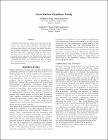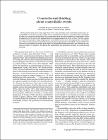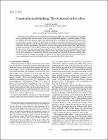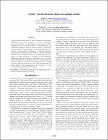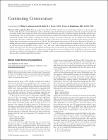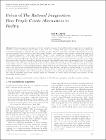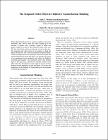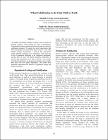Browsing School of Psychology by Author "BYRNE, RUTH MARY JOSEPHINE"
Now showing items 1-15 of 15
- Sort by:
- title
- issue date
- submit date
- Order:
- ascending
- descending
- Results:
- 5
- 10
- 20
- 40
- 60
- 80
- 100
-
Chess Masters' Hypothesis Testing
BYRNE, RUTH MARY JOSEPHINE (Mahwah, NJ: Erlbaum, 2004)Falsification may demarcate science from non-science as the rational way to test the truth of hypotheses. But experimental evidence from studies of reasoning shows that people often find falsification difficult. We ... -
A computational model of counterfactual thinking: The temporal order effect
BYRNE, RUTH MARY JOSEPHINE (Mahwah, NJ: Lawrence Erlbaum Associates, 2001)People generate counterfactual alternatives to realitywhen they think about how things might have happeneddifferently, 'if only?'. There are considerableregularities in the sorts of past events that peoplementally undo, ... -
Contradictions and counterfactuals: Generating belief revisions in conditional inference
BYRNE, RUTH MARY JOSEPHINE (Mahwah, NJ: Lawrence Erlbaum Associates, 2002)Reasoners revise their beliefs in the premises when an inference they have made is contradicted. We describe the results of an experiment that shows that the belief they revise depends on the inference they have made. They ... -
Counterfactual thinking about controllable events
BYRNE, RUTH MARY JOSEPHINE (2000)When people think about what might have been, they mentally undo controllable rather than uncontrollable events. We report the results of two experiments in which we examined this controllability effect in counterfactual ... -
Counterfactual thinking: the temporal order effect
BYRNE, RUTH MARY JOSEPHINE (2004)People often think about how things might have happened differently. Their counterfactual thoughts tend to mentally undo the most recent event in an independent sequence. Consider a game in which two players must each pick ... -
Deductive reasoning with factual, possible and counterfactual conditionals
BYRNE, RUTH MARY JOSEPHINE (Psychonomic Society, 1999)We compared reasoners' inferences from conditionals based on possibilities in the present or the past (e.g., "If Linda had been in Dublin then Cathy would have been in Galway") with their inferences based on facts in the ... -
'If only counterfactuals and the exceptionality effect'
BYRNE, RUTH MARY JOSEPHINE (Erlbaum, 2009)People create counterfactual `if only? alternatives that change exceptional actions to be normal (e.g., `if only he had placed his usual small bet he would have lost less money?). Two experiments show that this effect ... -
Mental models and pragmatics: Author's response
BYRNE, RUTH MARY JOSEPHINE (Cambridge University Press, 2000)Van der Henst argues that the theory of mental models lacks a pragmatic component. He fills the gap with the notion that reasoners draw the most relevant conclusions. We agree, but argue that theories need an element of ... -
People think about what is true for conditionals, not what is false: only true possibilities prime the comprehension of "if"
BYRNE, RUTH MARY JOSEPHINE (2009)We report the results of two priming experiments that examine the comprehension of conditionals--for example, "if there are apples then there are oranges"--and biconditionals--for example, "if and only if there are apples ... -
Precis of The Rational Imagination: How People Create Alternatives to Reality
BYRNE, RUTH MARY JOSEPHINE (2007)The human imagination remains one of the last uncharted terrains of the mind. People often imagine how events might have turned out ?if only? something had been different. The ?fault lines? of reality, those aspects more ... -
The rational imagination and other possibilities: Author's response
BYRNE, RUTH MARY JOSEPHINE (2007)In this response I discuss some of the key issues raised by the commentators on The Rational Imagination. I consider whether the imaginative creation of alternatives to reality is rational or irrational, and what happens ... -
The Temporal Order Effect in Children s Counterfactual Thinking
BYRNE, RUTH MARY JOSEPHINE (Mahwah, NJ: Lawrence Erlbaum Associates, 2005)When adults think about how an outcome could have turned out differently, they tend to undo the events leading up to the outcome in regular ways. Consider a game in which two players could win a prize if they picked the ... -
The temporality effect in counterfactual thinking about what might have been
BYRNE, RUTH MARY JOSEPHINE (Psychonomic Society, 2000)When people think about what might have been, they undo an outcome by changing events in regular ways. Suppose two contestants could win 1,000 Pounds if they picked the same color card; the first picks black, the second ... -
Understanding cumulative risk
BYRNE, RUTH MARY JOSEPHINE (2010)The authors investigated the relationship between reasoners' understanding of subjunctive conditionals (e.g., if p had happened, then q would have happened) and the inferences they were prepared to endorse. Reasoners who ... -
When falsification is the only path to truth
BYRNE, RUTH MARY JOSEPHINE (Mahwah, NJ: Lawrence Erlbaum Associates, 2005)Can people consistently attempt to falsify, that is, search for refuting evidence, when testing the truth of hypotheses? Experimental evidence indicates that people tend to search for confirming evidence. We report two ...




